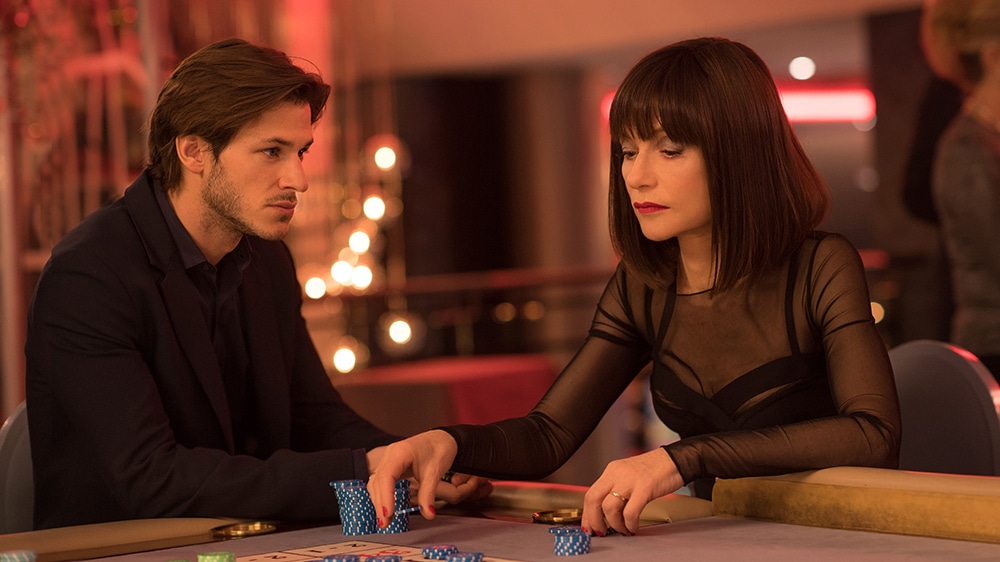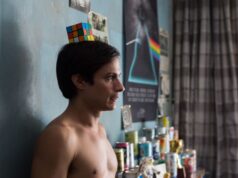Fourth-day coverage of the 68th Berlin International Film Festival with reviews of the Russian film Dovlatov and the French Eva
Dovlatov
No matter what you think of Vladimir Putin’s Russia today, seeing that a film like Dovlatov had the support and funding of the Russian government is at least a sign that things are now (culturally) different from 50 years ago. Times have changed, and a writer like Sergei Dovlatov (1941–1990) — who struggled to have his works appreciated in a decadent Soviet society that only valued inoffensive, uplifting art — has since become one of the most popular Russian writers of the late 20th century (even if after his death), which also gives his tragic story an ironically optimistic note that transcends what we see on screen.
Adopting a discreet approach with extended shots and a camera that glides almost invisibly as it observes the intellectual scene of a foggy Leningrad in November, 1971, director Aleksey German invests in a slightly washed cinematography of lower contrast to recreate the feel of this stagnant era. It looks like the milky mist is everywhere, in every room and every corner of those thankless times, despite the anniversary of the revolution being celebrated in the country. Sergei (Milan Maric), who used to be a prison guard, sees Soviet leader Leonid Brezhnev in his dreams and can’t help but isolate himself from his wife, who thinks he is talented even without money.
As the Writers’ Union won’t accept him, and publishers are only looking for works of moderate literary demand (like heroic acts and optimistic stories about oil workers), Sergei dreams of piña coladas but needs to borrow money to buy a big German doll for his daughter. With everyone refusing his works, he is forced to write about the making of a film for a factory newspaper and a subway worker who is also a poet. It is exasperating, and Milan Maric does a stellar job showing how Sergei uses his cynicism and mockery to conceal a great deal of worry and frustration — and when he finally explodes at someone, we understand his torment.
There is a collective feel of hopelessness among the penniless poets and writers of that generation as we see them drink, smoke, borrow money from one another and recite at parties. When they need to obtain forbidden items from the West, they resort to the black market. The contrast between the warmth of those parties and the oppressive cold outside is emphasized by the light and color temperature, and there is something immensely depressing in seeing Sergei’s friend Joseph Brodsky (Artur Beschastny) dubbing poetry for Polish films, having to shorten or widen words to make them fit — which, in essence, is not so different from the dubbing of movies today.
Despite being a bit repetitious sometimes, with lines that are uttered more than once and a redundant dialogue in the end that is only there to create “heartfelt drama” (see the irony?), Dovlatov asks us about the purpose of writing if you won’t get published. As someone points out, nobody thought anything of the impressionists in their time; and while it is tragic that most authors are only recognized when they are not alive anymore to collect the fruit of their art, it’s at least wonderful to see that there are people today who can appreciate a film like this.
Eva

The first scene of Eva is promising: Bertrand Valade (Gaspard Ulliel) is a male prostitute in Paris offering his services to an old English has-been writer who tells him about this new play he wrote that is never going to be published. Bertrand has no scruples about stealing from the man and is visibly disgusted by the very idea of even touching him, especially when asked to join him in a bathtub (which he hesitatingly accepts when offered more money). But after a curious incident when the client has a heart attack and dies, Bertrand steals his manuscript and goes on to become a famous playwright with a French version of the original play.
Unfortunately, the intriguing part ends there, and from then on, the film derails completely and never manages to find a reason to exist. I wonder if the book on which it is based (and was already made into an adaptation with Jeanne Moreau in 1962) is just as terrible, or if it was director Benoît Jacquot’s entire fault. Incapable of making Bertrand an interesting character, Eva tries to become some sort of erotic psychological thriller when he goes to his girlfriend’s chalet to write and meets a prostitute called Eva (Isabelle Huppert), who broke into the house with a client to escape a snowstorm. After that, he finds himself bizarrely obsessed with her.
Bertrand is a mediocre, unpleasant and generally rude man who doesn’t talk much and can’t even stand his own girlfriend, Caroline. It’s hard to understand what Caroline sees in this awful guy (yes, he is handsome, so what?), but she is also irritating (and nosy). Ulliel seems determined to make Bertrand a detestable character, and it can be a pain to watch a series of tedious conversations between him and Eva, who is always too blasé and candid about her work. See, he wants to write about her, or use her as an inspiration for his new play. Whatever. And the film comes up with a nonsensical concept of “third degree” in writing that doesn’t make any difference.
Filled with subplots and deviations that are purely inconsistent and purposeless (like anything involving Bertrand’s editor, or the lies that Eva tells about her husband), the film deranges into a cheap late-night turkey with no coherence or subtlety (there is a moment when Bertrand basically sticks his phone in our face so we can see he is calling Eva). Hell, even the guy’s obsession with her stems from nowhere, and the horrendous slow-motions (created by the duplication of frames) makes this look like a trashy movie that shouldn’t be in the main competition.





